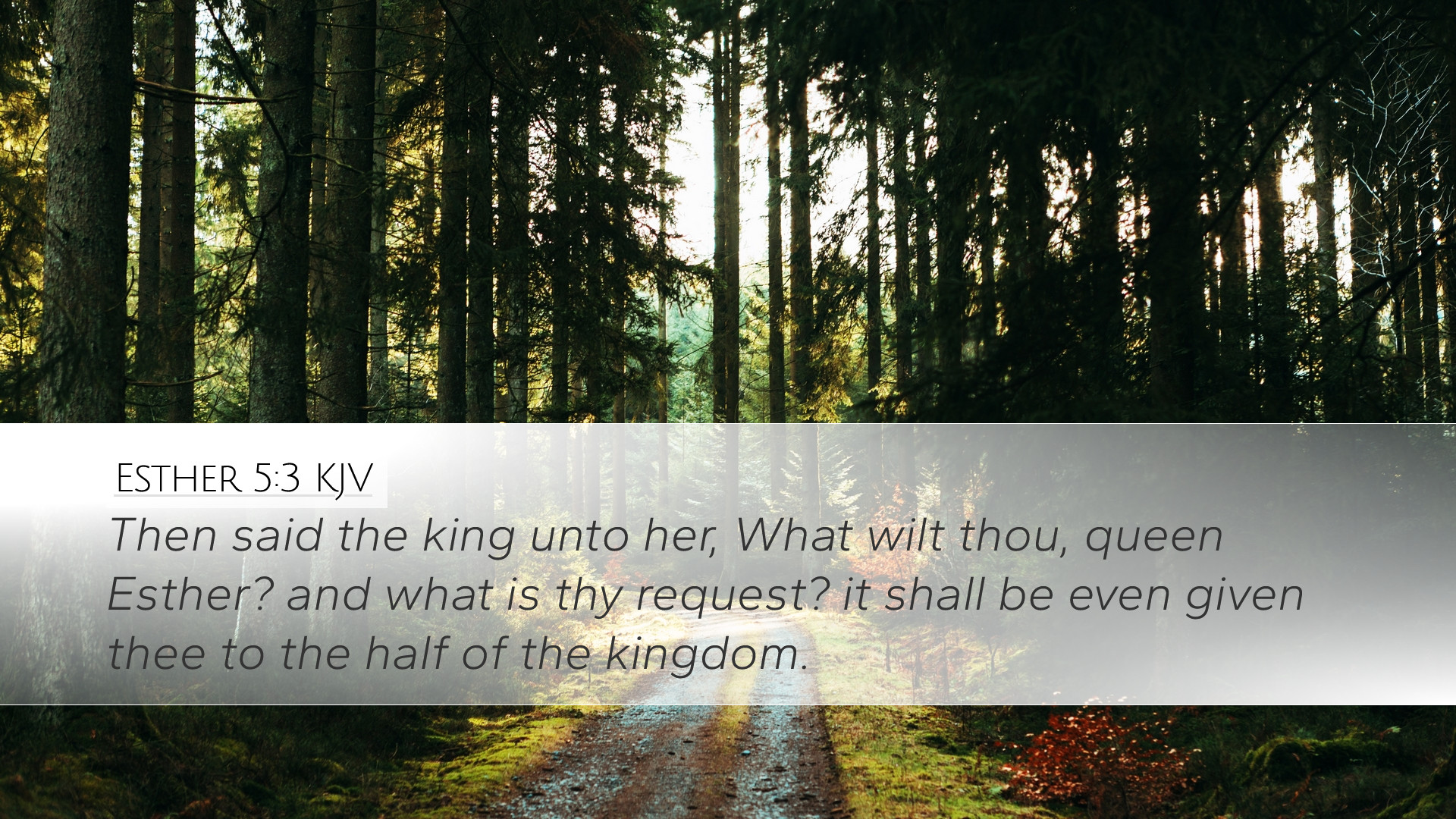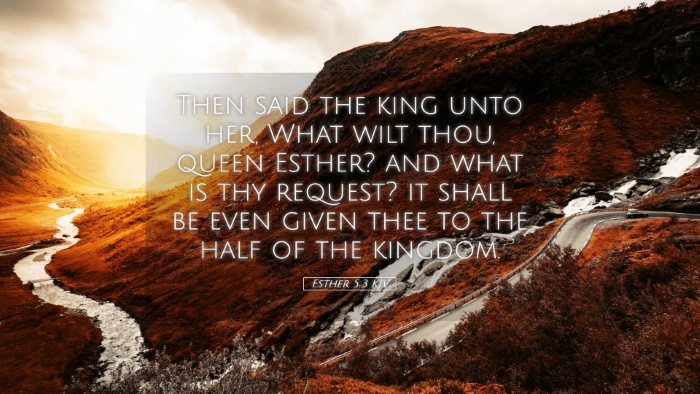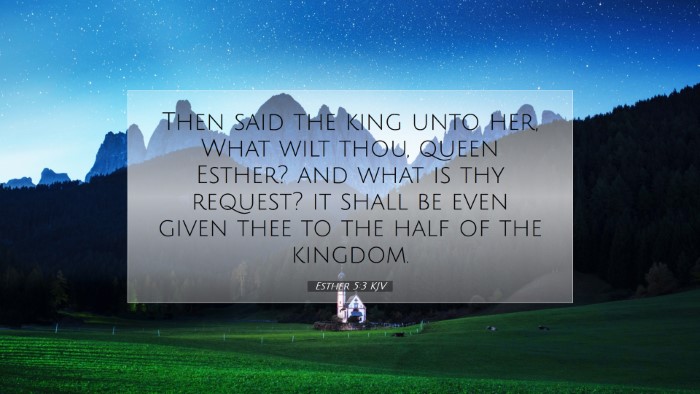Old Testament
Genesis Exodus Leviticus Numbers Deuteronomy Joshua Judges Ruth 1 Samuel 2 Samuel 1 Kings 2 Kings 1 Chronicles 2 Chronicles Ezra Nehemiah Esther Job Psalms Proverbs Ecclesiastes Song of Solomon Isaiah Jeremiah Lamentations Ezekiel Daniel Hosea Joel Amos Obadiah Jonah Micah Nahum Habakkuk Zephaniah Haggai Zechariah MalachiEsther 5:3
Esther 5:3 KJV
Then said the king unto her, What wilt thou, queen Esther? and what is thy request? it shall be even given thee to the half of the kingdom.
Esther 5:3 Bible Commentary
Commentary on Esther 5:3
Esther 5:3 presents a significant moment in the narrative of the Book of Esther, where Queen Esther approaches King Ahasuerus to reveal her identity and the plot against her people. This verse serves as a critical turning point in the story, encapsulating themes of courage, risk, and providence.
Historical Context
The Book of Esther is set during the Persian Empire, specifically under the reign of King Ahasuerus (commonly identified with Xerxes I). This historical backdrop is essential for understanding the political and social dynamics at play. Esther, a Jewish woman, became queen, which placed her in a unique position to advocate for her people. The decree against the Jews, instigated by Haman, created a pressing need for intervention.
Theological Insights
This verse reflects several theological themes:
- Courage: Esther's willingness to approach the king uninvited underscores her courage. In the ancient Near Eastern context, approaching the king without an invitation could result in death, highlighting her boldness and conviction.
- Providence: The invisibility of God throughout the Book of Esther does not negate His sovereignty. Esther’s actions demonstrate the interplay of divine providence and human agency.
- Identity: Esther's declaration of her Jewish identity is a profound moment of vulnerability. It sets the stage for her advocacy for the Jewish people, emphasizing the importance of personal identity in the face of societal pressures.
- Intercession: Esther's role as an intercessor reflects the broader biblical theme of advocating for others, a role that is consistent with Christ’s own intercession.
Commentary Excerpts
Matthew Henry: In his commentary, Matthew Henry emphasizes the gravity of Esther's situation. He notes how she displayed both wisdom and courage in her approach to the king. Her deep sense of duty to her people propelled her to speak up, risking her life for their salvation. Henry suggests that Esther's prayer and fasting before this pivotal moment signify a reliance on divine guidance.
Albert Barnes: Barnes provides a detailed analysis of the cultural implications of Esther's actions. He elucidates how Esther’s boldness not only demonstrates her desperation but her alignment with God’s plan. Barnes highlights the importance of Esther’s strategic approach, suggesting that her patience and planning were crucial in achieving the desired outcome. He also discusses the significance of her request to the king, framing it within a broader narrative of justice and divine intervention.
Adam Clarke: Clarke focuses on the emotional and spiritual dimensions of Esther's encounter with the king. He suggests that Esther’s heart must have been filled with trepidation and faith as she stood in the king’s presence. Clarke's interpretation emphasizes the necessity of prayer and preparation in the face of great trials. He encourages readers to consider the weight of responsibility that comes with privilege and position, as Esther used her status to effect change.
Practical Applications
The reflections on Esther 5:3 yield several applications for contemporary believers:
- Embrace Courage: Like Esther, Christians are called to step out in courage, particularly in advocating for justice and righteousness.
- Recognize God’s Providence: Believers are encouraged to trust in God’s sovereign hand, even when His presence is not overtly visible in their circumstances.
- Stand Firm in Identity: Understanding and embracing one’s identity in Christ is crucial, especially in a world that often challenges faith-based values.
- Be an Advocate: Followers of Christ are reminded of their role as intercessors, called to stand in the gap for others and speak truth to power.
Conclusion
Esther 5:3 is not merely a narrative detail; it represents a rich tapestry of theological themes and lessons applicable to believers today. The courage exhibited by Esther, her reliance on divine providence, and her commitment to her identity and people reflect the behaviors and attitudes that Christians are called to embody. As we contemplate this verse, may we be inspired to act justly, love mercy, and walk humbly with our God.


